Hello and welcome to Episode 6 of Read Paradise Lost with me, Jane Davis, a podcast and Substack newsletter about my project to read all of Paradise Lost by John Milton, aloud, and with a sometimes word-by-word, sometimes line-by-line discussion. This is one-take recording with no editing, so forgive noise of seagulls, my coughing, or sound of men drilling next door. Rough and ready reading is what you get.
See Episode 1 for an introduction to the project.
We’re reading Book 1 lines 125-191 today. I’ll read it through, but most of us will get lost at some point. Don’t worry about that - that verse is tough and sinewy and hard to chew, but I’ll break it down into bite size pieces after the first reading.
Last week we’d heard Satan speak for the first time, ‘in pain, /Vaunting aloud, but rackt with deep despare.’
Illustration to Book1 of the 1688 edition of Paradise Lost, by an unknown engraver. satan uses a long stick to prod his colleagues onto action. Do you think he looks rather blankly traumatised?
Now his co-rebel, Beelzebub, replies, (and then Satan (now called ‘the Arch-fiend) will speak again.) So Beelzebub: :
O Prince, O Chief of many Throned Powers,
That led th' imbattelld Seraphim to Warr
Under thy conduct, and in dreadful deeds [ 130 ]
Fearless, endanger'd Heav'ns perpetual King;
And put to proof his high Supremacy,
Whether upheld by strength, or Chance, or Fate,
Too well I see and rue the dire event,
That with sad overthrow and foul defeat [ 135 ]
Hath lost us Heav'n, and all this mighty Host
In horrible destruction laid thus low,
As far as Gods and Heav'nly Essences
Can perish: for the mind and spirit remains
Invincible, and vigour soon returns, [ 140 ]
Though all our Glory extinct, and happy state
Here swallow'd up in endless misery.
But what if he our Conquerour, (whom I now
Of force believe Almighty, since no less
Then such could hav orepow'rd such force as ours) [ 145 ]
Have left us this our spirit and strength intire
Strongly to suffer and support our pains,
That we may so suffice his vengeful ire,
Or do him mightier service as his thralls
By right of Warr, what e're his business be [ 150 ]
Here in the heart of Hell to work in Fire,
Or do his Errands in the gloomy Deep;
What can it then avail though yet we feel
Strength undiminisht, or eternal being
To undergo eternal punishment? [ 155 ]
Whereto with speedy words th' Arch-fiend reply'd.
Fall'n Cherube, to be weak is miserable
Doing or Suffering: but of this be sure,
To do ought good never will be our task,
But ever to do ill our sole delight, [ 160 ]
As being the contrary to his high will
Whom we resist. If then his Providence
Out of our evil seek to bring forth good,
Our labour must be to pervert that end,
And out of good still to find means of evil; [ 165 ]
Which oft times may succeed, so as perhaps
Shall grieve him, if I fail not, and disturb
His inmost counsels from thir destind aim.
But see the angry Victor hath recall'd
His Ministers of vengeance and pursuit [ 170 ]
Back to the Gates of Heav'n: The Sulphurous Hail
Shot after us in storm, oreblown hath laid
The fiery Surge, that from the Precipice
Of Heav'n receiv'd us falling, and the Thunder,
Wing'd with red Lightning and impetuous rage, [ 175 ]
Perhaps hath spent his shafts, and ceases now
To bellow through the vast and boundless Deep.
Let us not slip th' occasion, whether scorn,
Or satiate fury yield it from our Foe.
Seest thou yon dreary Plain, forlorn and wilde, [ 180 ]
The seat of desolation, voyd of light,
Save what the glimmering of these livid flames
Casts pale and dreadful? Thither let us tend
From off the tossing of these fiery waves,
There rest, if any rest can harbour there, [ 185 ]
And reassembling our afflicted Powers,
Consult how we may henceforth most offend
Our Enemy, our own loss how repair,
How overcome this dire Calamity,
What reinforcement we may gain from Hope, [ 190 ]
If not what resolution from despare.
First, I notice that, like Satan, Beelzebub believes that although they lost the war in heaven, they nearly won, and;
endanger'd Heav'ns perpetual King;
And put to proof his high Supremacy,
Whether upheld by strength, or Chance, or Fate,
Too well I see and rue the dire event,
That with sad overthrow and foul defeat [ 135 ]
Hath lost us Heav'n,
And I see that, like Satan, Beelzebub moves between the vaunting mode (we endanger’d God) and then despair, as he sinks into realisation that ‘foul defeat/hath lost us heav’n.’ And does it matter whether God won by strength or by fate or by chance? Fact is, we’re here and done for, because what are we without our former glory:
all this mighty Host
In horrible destruction laid thus low,
As far as Gods and Heav'nly Essences
Can perish: for the mind and spirit remains
Invincible, and vigour soon returns, [ 140 ]
Though all our Glory extinct, and happy state
Here swallow'd up in endless misery.
I’m interested that, being immortal, the rebel angels feel, even as they now speak in ‘horrible destruction laid thus low’, ‘vigour’ returning. I turn to the Etymological dictionary:
c. 1300, "physical strength, energy in an activity," from Anglo-French vigour, Old French vigor "force, strength" (Modern French vigueur), from Latin vigorem (nominative vigor) "liveliness, activity, force," from vigere "be lively, flourish, thrive," from PIE root *weg- "to be strong, be lively."
And I’m not surprised to see that the word is connected to strength or power and force.
A reader wondered what such boundless immortal energy would be like with no ‘glory’ - and what is ‘glory’ anyhow?
c. 1200, gloire "the splendor of God or Christ; praise offered to God, worship," from Old French glorie "glory (of God); worldly honor, renown; splendor, magnificence, pomp" (11c., Modern French gloire), from Latin gloria "fame, renown, great praise or honor," a word of uncertain origin.
The etymology as *gnoria "knowledge, fame" to gnarus "known" and i-gnorare has been acknowledged by some scholars, and rejected by others. In its favour speak the semantics of words for "glory", which in Indo-European societies mostly have to do with "spoken praise", "reputation by hearsay". Against the assumed etymology speak the phonetics. [de Vaan]
Meaning "one who is a source of glory" is from mid-14c. Also in Middle English "thirst for glory, vainglory, pride, boasting, vanity" (late 14c.), Sense of "magnificence" is late 14c. in English. Meaning "worldly honor, fame, renown." Latin also had gloriola "a little fame." Glory days was in use by 1970. Old Glory for "the American flag" is first attested 1862.
The Christian senses are from the Latin word's use in the Bible to translate Greek doxa "expectation" (Homer), later "an opinion, judgment," and later still "opinion others have of one (good or bad), fame; glory," which was used in Biblical writing to translate a Hebrew word which had a sense of "brightness, splendor, magnificence, majesty of outward appearance." The religious use has colored that word's meaning in most European tongues. Wuldor was an Old English word used in this sense.
To have the immortal being of a god-like creature without the light or reputation, without the goodness, or the majesty… this is a terrible fate, which Beelezebub recognises as ‘endless misery’. His thoughts turn to God’s purpose: ‘But what if he our Conquerour…?’ and he wonders what function, as God’s thralls (thrall= one who must serve another) the rebels must now serve in Hell. Beelzebub, left to himself then couldn’t not have imagined the fightback. But Satan is on it. He picks up on Beelzebub’s word, ‘misery’:
Fall'n Cherube, to be weak is miserable
Doing or Suffering: but of this be sure,
To do ought good never will be our task,
But ever to do ill our sole delight, [ 160 ]
As being the contrary to his high will
Whom we resist.
He turns misery to delight through his contrariness. The resistance continues. And on and on it cycles, whatever God does/wants , we do/want the opposite.
I read this as a piece of human psychology, whereby the weak or punished or excluded may want to assert types of power by reaction against the strong - thinking of ordinary human things like vandalism - but I’m also thinking about the continued diametric opposition of good and evil, positive and negative in the universe, in all things.
But as Satan continues, I’m trying to imagine this in terms of human behaviours I know. This sounds like a person. (I’m thinking of Iago or Richard III) , not a universal principle speaking:
If then his Providence
Out of our evil seek to bring forth good,
Our labour must be to pervert that end,
And out of good still to find means of evil; [ 165 ]
Which oft times may succeed, so as perhaps
Shall grieve him, if I fail not, and disturb
His inmost counsels from thir destind aim.
Readers were interested in Milton’s use of the verb ‘grieve’ here, so I look it up:
c. 1200, transitive, "to make worried or depressed; to make angry, enrage;" also "to be physically painful, cause discomfort;" c. 1300 as "cause grief to, disappoint, be a cause of sorrow;" also "injure, harass, oppress," from tonic stem of Old French grever "afflict, burden, oppress," from Latin gravare "make heavy; cause grief," from gravis "weighty" (from PIE root *gwere- (1) "heavy"). Intransitive sense of "be sorry, lament" is from c. 1400. Related: Grieved; grieving.
It is the element of sorrow that is interesting in ‘grieve’ - it is not simply damage, but emotional pain, that Satan wants to inflict. I wonder now what Satan is referring to when he says he hopes to disturb God’s ‘inmost counsels from thir destind aim.’ As novice readers, we don’t know it yet, but (spoiler) it may be that Satan is referring to the triumph of Christ, God’s son, who will, later, restore all things. And could that be what he is referring to now, when he looks and notices that whoever was chasing them down (if indeed there was any such force… I just don’t know what to believe) is now called off:
But see the angry Victor hath recall'd
His Ministers of vengeance and pursuit [ 170 ]
Back to the Gates of Heav'n: The Sulphurous Hail
Shot after us in storm, oreblown hath laid
The fiery Surge, that from the Precipice
Of Heav'n receiv'd us falling, and the Thunder,
Wing'd with red Lightning and impetuous rage, [ 175 ]
Perhaps hath spent his shafts, and ceases now
To bellow through the vast and boundless Deep.
There’s a helpful note in the Fowler edition:
I’m particularly interested in the reference to Empson’s reading (a book I read so long ago that I’ve forgotten it, currently re-reading) which matches my own sense that these two creatures are not in clear minds, and don’t seem to tell the truth or perhaps have a twisted memory of what happened. Did they nearly win? Or was it a crushing defeat?
Either way Satan moves to action:
Let us not slip th' occasion, whether scorn,
Or satiate fury yield it from our Foe.
Seest thou yon dreary Plain, forlorn and wilde, [ 180 ]
The seat of desolation, voyd of light,
Save what the glimmering of these livid flames
Casts pale and dreadful? Thither let us tend
From off the tossing of these fiery waves,
There rest, if any rest can harbour there, [ 185 ]
And reassembling our afflicted Powers,
Consult how we may henceforth most offend
Our Enemy, our own loss how repair,
How overcome this dire Calamity,
What reinforcement we may gain from Hope, [ 190 ]
If not what resolution from despare.
Even here in Hell, Satan asserts, there is a place a little less bad than the place we are in, let’s go there to make plans to continue the fight.
Reader, remember Satan’s ‘all is not lost’? from last week? Here it is in action. Yet I have also in mind Milton’s belief that in hell, ‘hope never comes/that come to all.’ So is it hope or is it self-delusion, or something like self-assertion? There’s certainly self-something there and whatever it is, Satan is (unlike Beelzebub) full of the desire for self-determination, and so his speech contains many strong verbs of action: reassembling, consult, offend, repair, overcome, gain, resolution.
You may be wondering why an all powerful God allows Satan to go on like this - why didn’t he just kill him outright, as any self-respecting winner of a huge battle might do? I’d ask you to keep that thought in mind.
That’s it for today, more next week.


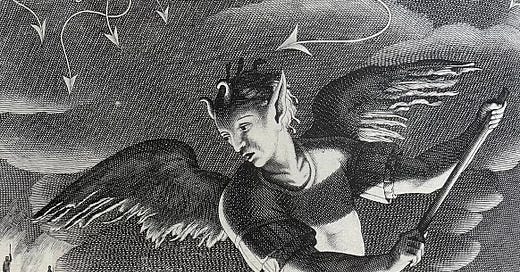



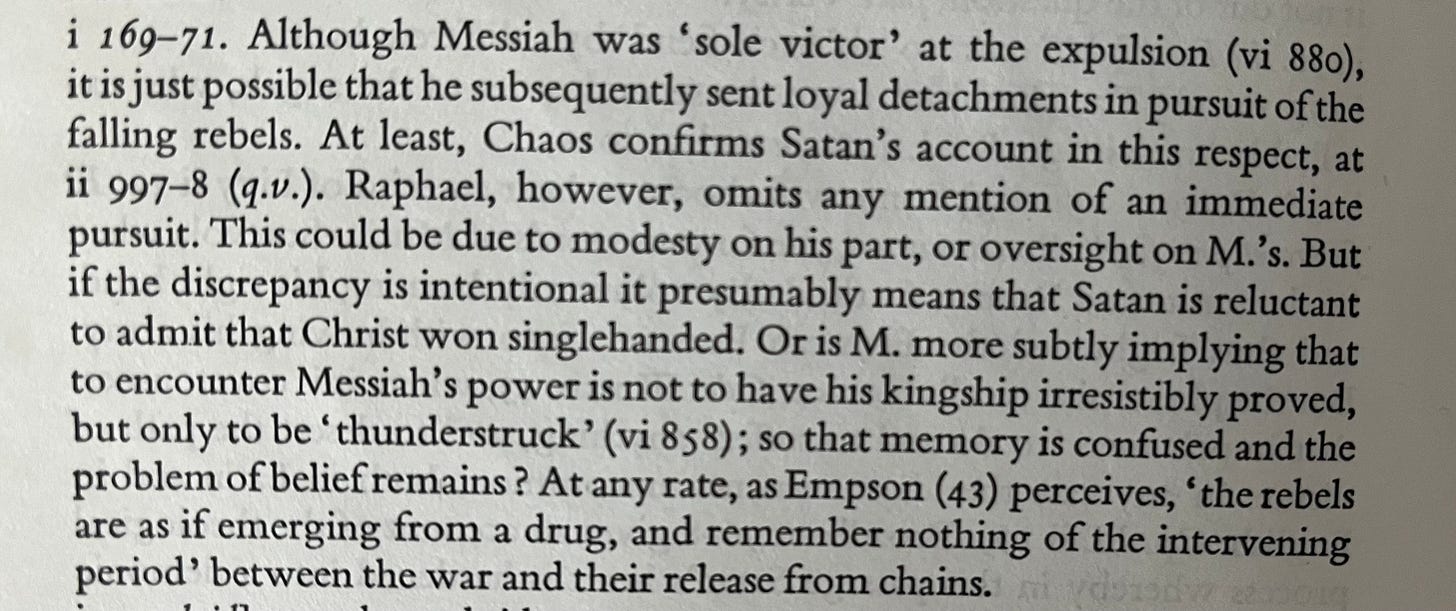

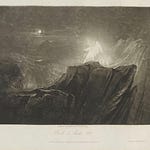
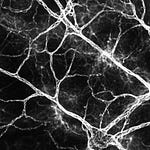


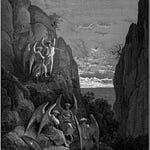
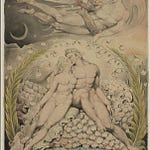


Share this post